Litóhoro, Pieria, Greece, Friday evening, 17 November 2000
Yet again apologies are due to faithful readers who have been waiting all too long for a new journal entry. Also, note that the server is switching to a new domain name, and in a matter of months the old URL will cease to answer. I suggest you change your link or bookmark for this journal now to /academics/colleges/arts_and_letters/english/donovan, since the new domain is already operational.
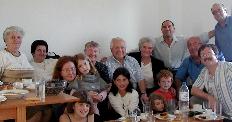 On Sunday, 15 October (the day after my last entry) we had a party at our apartment in Litóhoro to celebrate Joann's, Ariadne's, and Trevor's birthdays. We exerted ourselves a good deal in cleaning but did not attempt a full meal, only store-bought glýka (sweets), Greek coffee, and liqueurs. Paul and little Chrysoúla were rather sorely tasked as translators. I used time-delay and tripod to get a picture of the entire group. Adult heads, from left, belong to Penelópi, Déspina, Stas, Joann, Paul, Iríni, Chrysóstomos, unknown cousin-of-cousin, me, and Sími. Child heads, from left, belong to Larissa, Ariadne, Chrysoúla, Iríni, and Trevor. Penelópi, the elder Iríni, and Chrysóstomos are siblings, all born with the same last name as Paul and Stas: Pagiotas. (Two other siblings live in Pennsylvania.) Déspina is Chrysóstomos' wife and Chrysoúla is their daughter. The elder Iríni is married to Sími and little Iríni is their granddaughter. (Given names are heavily recycled within Greek families.) Everyone seemed to have a good time. The next day Paul and Joann left for the USA, which occasioned a lot of tears from the children.
On Sunday, 15 October (the day after my last entry) we had a party at our apartment in Litóhoro to celebrate Joann's, Ariadne's, and Trevor's birthdays. We exerted ourselves a good deal in cleaning but did not attempt a full meal, only store-bought glýka (sweets), Greek coffee, and liqueurs. Paul and little Chrysoúla were rather sorely tasked as translators. I used time-delay and tripod to get a picture of the entire group. Adult heads, from left, belong to Penelópi, Déspina, Stas, Joann, Paul, Iríni, Chrysóstomos, unknown cousin-of-cousin, me, and Sími. Child heads, from left, belong to Larissa, Ariadne, Chrysoúla, Iríni, and Trevor. Penelópi, the elder Iríni, and Chrysóstomos are siblings, all born with the same last name as Paul and Stas: Pagiotas. (Two other siblings live in Pennsylvania.) Déspina is Chrysóstomos' wife and Chrysoúla is their daughter. The elder Iríni is married to Sími and little Iríni is their granddaughter. (Given names are heavily recycled within Greek families.) Everyone seemed to have a good time. The next day Paul and Joann left for the USA, which occasioned a lot of tears from the children.
That Thursday, 20 October, I went to dinner at the house of a former academic, now free-lance, a couple of kilometers west of the town and four hundred meters higher up the mountainside. Our landlord had given him my number, rightly thinking we would have a lot to talk about. Conversation was in English, and both it and the food were a great treat. (Stas was feeling a bit under the weather and opted to stay home, and in that case I decided to leave the children home too, since their prejudices on food would be rather an embarrassment.) The house is named "Pantheon," and is in the form of an elliptical dodecagon, apparently in honor of the twelve principal divinities of Olympus--whom Prof. Olýmpios and his wife Elpída worship at an outdoor altar surrounded by Ionic columns. (The number of these principal divinities is commonly given as twelve, but which twelve are they? Even my hosts had some trouble with that. I tend to include all six children of Cronus and Rhea--Zeus, Poseidon, Hades, Demeter, Hestia and Hera--plus Apollo, Artemis, Athena, Ares, Aphrodite, and Hermes. Elpída thought Hades or Pluto should be left out, as not a resident of the mountain, and Hephaestus included. The Oxford Classical Dictionary bases its list on the Parthenon frieze and omits both Hades and Hestia, so that not only Hephaestus but also Dionysus can be included.) Elpída described her feelings about seeing classical statues of these divinities in archaeological museums, and compared them to those of American Indians regarding museum exhibits of their sacred objects. In both cases distress arises at the imprisonment of what are felt to be living beings, perhaps akin to the distress many feel about zoos. Prof. Olýmpios' academic field was business administration, and he has been writing on relations between knowledge and means of production, covering some of the same ground as Marx but taking a rather different view. He was much delighted at a quotation I dredged up from somewhere in memory, to the effect that if you're not a communist at twenty you have no heart, but if you're still a communist at forty you have no head. I could not and cannot remember who said that, though, and my trusty Bartlett's does not help.
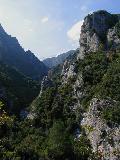
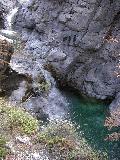
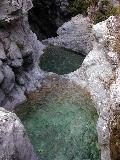
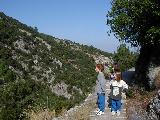 The following Sunday, 22 October, we all went for our first substantial hike towards the mountain, a walk in the gorge of the river Enipeus. (Modern pronunciation would render that Enipefs, but except in the name of one local hotel the old nominative form has been pretty much abandoned, and the accusative form Enipéas now does double duty, serving for nominative as well. Among ancient authorities, the name occurs in the genitive in Homer and Herodotus, and in the dative in Thucydides.) A local tourist brochure identifies this spectacular gorge as the site of Hera's persecution of Leto (the goddess who bore to Zeus the divine twins Apollo and Artemis). Most of the climbing was in the half-hour walk through and out of the town to the trail-head. Once we made it that far, the trail got and stayed on top of a concrete aqueduct, with an intermittent iron railing and a steady slope so slight as to be imperceptible. The aqueduct hugs the mountainside for something under a kilometer, occasionally (and in view of Greece's level of seismic activity, somewhat alarmingly) spanning a chasm. The trail ends where the aqueduct begins, at a small dam where about half the river is diverted into it, and there is nothing to do but turn back. Near the trail-head, though, another trail diverges from it uphill; we tried that briefly on our way back, but it was too steep for most of our party.
The following Sunday, 22 October, we all went for our first substantial hike towards the mountain, a walk in the gorge of the river Enipeus. (Modern pronunciation would render that Enipefs, but except in the name of one local hotel the old nominative form has been pretty much abandoned, and the accusative form Enipéas now does double duty, serving for nominative as well. Among ancient authorities, the name occurs in the genitive in Homer and Herodotus, and in the dative in Thucydides.) A local tourist brochure identifies this spectacular gorge as the site of Hera's persecution of Leto (the goddess who bore to Zeus the divine twins Apollo and Artemis). Most of the climbing was in the half-hour walk through and out of the town to the trail-head. Once we made it that far, the trail got and stayed on top of a concrete aqueduct, with an intermittent iron railing and a steady slope so slight as to be imperceptible. The aqueduct hugs the mountainside for something under a kilometer, occasionally (and in view of Greece's level of seismic activity, somewhat alarmingly) spanning a chasm. The trail ends where the aqueduct begins, at a small dam where about half the river is diverted into it, and there is nothing to do but turn back. Near the trail-head, though, another trail diverges from it uphill; we tried that briefly on our way back, but it was too steep for most of our party.
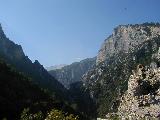

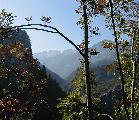
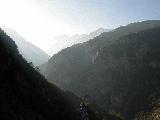 I returned alone after lunch the next day to explore the higher trail more thoroughly. After reaching the trail-head in about twenty minutes I spent three and a half hours walking along this trail and back. I found it extremely strenuous going even though it was by no means all uphill; rather, it went up and down quite a bit. The trail stayed high above the level of the aqueduct, though, and of course went a very great deal further back into the gorge. I'll let the photos speak for how spectacular the prospects were, though they can hardly begin to do the subject justice. I did not reach the end of the trail at Priónia; that is said to be five hours one way. Across the gorge from the trail-head some half a dozen people were soaring about in parachutes. These are colorful and blessedly silent, but still I rather like to contemplate and photograph scenes that look as they might have looked centuries ago. These hang-glider parachutes are very modern technology, but then I reflected, somewhat ironically, that the modern technology of digital photography would allow me simply to erase them from the sky. (Of this batch of photos, though, only the leftmost had a parachute in it, and I left that one in.)
I returned alone after lunch the next day to explore the higher trail more thoroughly. After reaching the trail-head in about twenty minutes I spent three and a half hours walking along this trail and back. I found it extremely strenuous going even though it was by no means all uphill; rather, it went up and down quite a bit. The trail stayed high above the level of the aqueduct, though, and of course went a very great deal further back into the gorge. I'll let the photos speak for how spectacular the prospects were, though they can hardly begin to do the subject justice. I did not reach the end of the trail at Priónia; that is said to be five hours one way. Across the gorge from the trail-head some half a dozen people were soaring about in parachutes. These are colorful and blessedly silent, but still I rather like to contemplate and photograph scenes that look as they might have looked centuries ago. These hang-glider parachutes are very modern technology, but then I reflected, somewhat ironically, that the modern technology of digital photography would allow me simply to erase them from the sky. (Of this batch of photos, though, only the leftmost had a parachute in it, and I left that one in.)
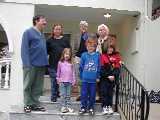 On Wednesday (25 October) my parents arrived for a week's stay. They arrived in the evening, and reported some difficulty in convincing the people on the train that they really did want to be set down at the newly-built and still derelict station at Litóhoro; but I was waiting for them there with a taxi. (No one had warned us of the problem when we first arrived, and on that occasion it really was a problem, and a serious one at that.) They had just finished a cruise that had taken them to Tunisia, Libya, Malta, Sicily, and Crete, so we did not plan or do a lot of sightseeing. On Thursday we took them on the aqueduct walk; that was a bit soon, but we could not count on the weather's continuing to favor that expedition. On Saturday we went to Thessaloníki for "Óhi Day," the premier Greek patriotic holiday, commemorating the occasion when the Greek dictator Metaxas made that word ("no") his sole reply to an ultimatum from Mussolini. (The story may well be apocryphal.) We had been misinformed by the tourist police regarding the parade route, and so we got only a distant view of the parade, which seemed to consist largely of tanks and other such motorized murder weapons, so I guess we weren't missing much; and we did get to see the city with less traffic and more sunshine than usual. My parents departed by train the next Wednesday morning. The photo shows us all on that morning in front of the Villa Drosos, very accommodating hotel where they stayed just a block from our apartment. (While they were staying there, we had several meals at the hotel, among the very best we'd had out anywhere in this town; we also cooked up some good seafood dinners in the apartment.) Once again the children cried fit to burst at their grandparents' departure.
On Wednesday (25 October) my parents arrived for a week's stay. They arrived in the evening, and reported some difficulty in convincing the people on the train that they really did want to be set down at the newly-built and still derelict station at Litóhoro; but I was waiting for them there with a taxi. (No one had warned us of the problem when we first arrived, and on that occasion it really was a problem, and a serious one at that.) They had just finished a cruise that had taken them to Tunisia, Libya, Malta, Sicily, and Crete, so we did not plan or do a lot of sightseeing. On Thursday we took them on the aqueduct walk; that was a bit soon, but we could not count on the weather's continuing to favor that expedition. On Saturday we went to Thessaloníki for "Óhi Day," the premier Greek patriotic holiday, commemorating the occasion when the Greek dictator Metaxas made that word ("no") his sole reply to an ultimatum from Mussolini. (The story may well be apocryphal.) We had been misinformed by the tourist police regarding the parade route, and so we got only a distant view of the parade, which seemed to consist largely of tanks and other such motorized murder weapons, so I guess we weren't missing much; and we did get to see the city with less traffic and more sunshine than usual. My parents departed by train the next Wednesday morning. The photo shows us all on that morning in front of the Villa Drosos, very accommodating hotel where they stayed just a block from our apartment. (While they were staying there, we had several meals at the hotel, among the very best we'd had out anywhere in this town; we also cooked up some good seafood dinners in the apartment.) Once again the children cried fit to burst at their grandparents' departure.
The next Saturday (4 November) Stas went off to England by herself for a few days, yet again to Tunbridge Wells. I saw her off at the airport in Thessaloníki, having left the children in Kateríni with Chrysoúla and Despína. Stas went to the British Museum on Sunday, Guy Fawkes day, as her business in Tunbridge Wells would not get underway till Monday. She flew back on Thursday and we all met her at the airport. In the eight days since then, life has been fairly routine here, as I have been working on my main sabbatical project.
Just a few days ago a new shop opened up in our neighborhood, largely devoted to American Indian stuff. I could not resist walking in the first day and greeting the staff in Ojibwe. The next day, yesterday, I actually bought something, a dream-catcher, as the children are used to sleeping with one in the room, and had been complaining of bad dreams. Now if we could only get a mold-catcher--moldy walls are becoming the real nightmare around here, what with ten human lungs sharing one small apartment, and just enough chill outside to make the French doors fog but not enough to warrant turning the heat on.
Also yesterday the children and I celebrated the long-awaited arrival of an adequate dumpster for our building, by clearing the trash from the field in front of our apartment. All the trash from our building that would not fit in the old dumpster had been regularly rifled by dogs and strewn about that field, but now we hope that problem is over. I counted the hour we spent on this as part of the day's home-school time--"service learning" I guess is the term.
previous entry
next entry
main/ToC page
 On Sunday, 15 October (the day after my last entry) we had a party at our apartment in Litóhoro to celebrate Joann's, Ariadne's, and Trevor's birthdays. We exerted ourselves a good deal in cleaning but did not attempt a full meal, only store-bought glýka (sweets), Greek coffee, and liqueurs. Paul and little Chrysoúla were rather sorely tasked as translators. I used time-delay and tripod to get a picture of the entire group. Adult heads, from left, belong to Penelópi, Déspina, Stas, Joann, Paul, Iríni, Chrysóstomos, unknown cousin-of-cousin, me, and Sími. Child heads, from left, belong to Larissa, Ariadne, Chrysoúla, Iríni, and Trevor. Penelópi, the elder Iríni, and Chrysóstomos are siblings, all born with the same last name as Paul and Stas: Pagiotas. (Two other siblings live in Pennsylvania.) Déspina is Chrysóstomos' wife and Chrysoúla is their daughter. The elder Iríni is married to Sími and little Iríni is their granddaughter. (Given names are heavily recycled within Greek families.) Everyone seemed to have a good time. The next day Paul and Joann left for the USA, which occasioned a lot of tears from the children.
On Sunday, 15 October (the day after my last entry) we had a party at our apartment in Litóhoro to celebrate Joann's, Ariadne's, and Trevor's birthdays. We exerted ourselves a good deal in cleaning but did not attempt a full meal, only store-bought glýka (sweets), Greek coffee, and liqueurs. Paul and little Chrysoúla were rather sorely tasked as translators. I used time-delay and tripod to get a picture of the entire group. Adult heads, from left, belong to Penelópi, Déspina, Stas, Joann, Paul, Iríni, Chrysóstomos, unknown cousin-of-cousin, me, and Sími. Child heads, from left, belong to Larissa, Ariadne, Chrysoúla, Iríni, and Trevor. Penelópi, the elder Iríni, and Chrysóstomos are siblings, all born with the same last name as Paul and Stas: Pagiotas. (Two other siblings live in Pennsylvania.) Déspina is Chrysóstomos' wife and Chrysoúla is their daughter. The elder Iríni is married to Sími and little Iríni is their granddaughter. (Given names are heavily recycled within Greek families.) Everyone seemed to have a good time. The next day Paul and Joann left for the USA, which occasioned a lot of tears from the children.








